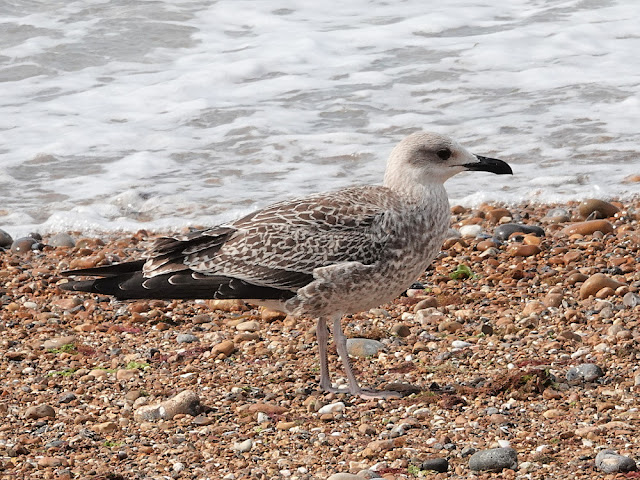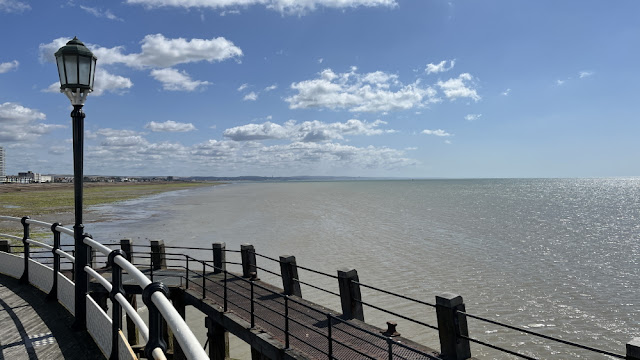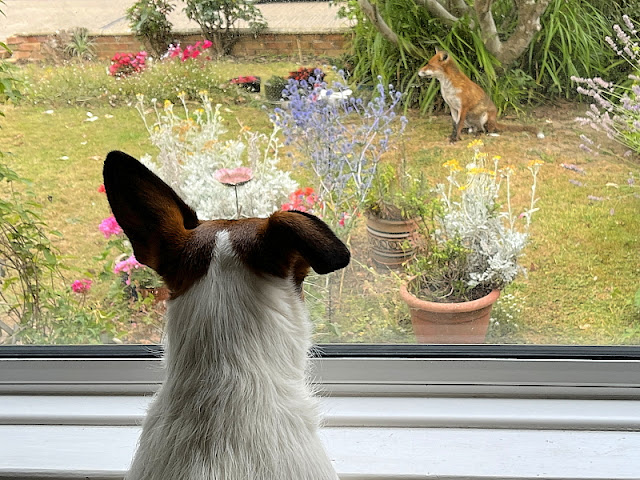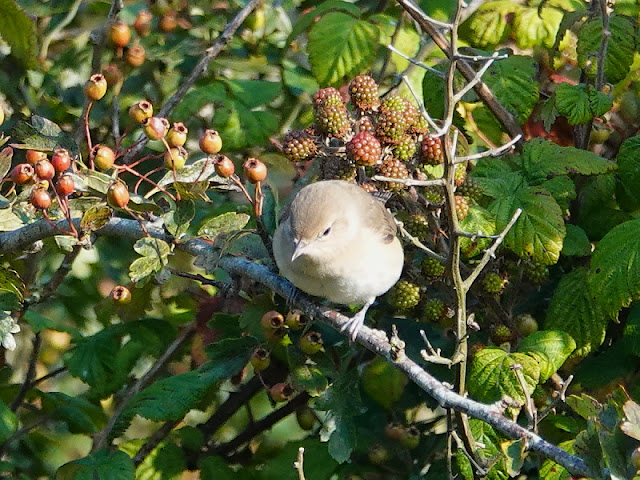Sunday 13 July 2025. Mill Hill with Megan and Otis: 4 Swallows, Whitethroat and 5 Goldfinches.
Monday 14 July 2025. Shoreham Harbour (East side) with Megan and Otis: Eider, 5 Lesser Black-backed Gulls and a Raven.
 |
| juvenile Lesser Black-backed Gull on Southwick Beach, a rather heavy billed bird that had me scratching my head until I noticed its legs |
 |
| Shoreham Harbour Eider now in full eclipse plumage |
Tuesday 15 July 2025. Widewater 06:35-08:35, strong SW, clear: Oystercatcher 1E, Whimbrel 1E, Mediterranean Gull 2W (adults), Sandwich Tern 3E:2W, Fulmar 1E, Manx Shearwater 1W (jmid-distance at 07:20) and Gannet 7E:14W. Adur (Toll Bridge to the sea) with Otis: Black Swan, 8 Oystercatchers (including a juvenile), 5 Lapwings, 2 Whimbrel, 2 Common Sandpipers,18 Redshank, Greenshank, 5 Mediterranean Gulls, 2 Little Egrets and a Kestrel.
 |
| Whimbrel by the Dogs Trust |
 |
juvenile Oystercatcher opposite Coronation Green
|
 |
| Mediterranean and Black-headed Gulls on the Adur |
Wednesday 16 July 2025. Worthing with Megan and Otis:
 |
| looking west at low tide |
 |
| looking east |
Thursday 17 July 2025. Lancing Ring/Steepdown with Megan and Otis: Quail heard, 9 Swifts, Green Woodpecker, Kestrel, 5 Skylarks, 4 Chiffchaff, 5 Whitethroats, Redstart heard by Merlin (not located in a brief look), 9 Linnets and 9 Corn Buntings
 |
| Corn Buntings on Steepdown |
 |
| Otis on lookout duty (self-appointed) |

Friday 18 July 2025. Adur (Toll Bridge to the sea) with Otis: 22 Mute and the Black Swan, 4 Oystercatchers, 6 Whimbrel, 3 Common Sandpipers,20 Redshank, Greenshank, juvenile Mediterranean Gulls, 2 Sandwich Terns, 3 Little Egrets, Meadow Pipit, 4 Linnets and 10 Goldfinches.
Saturday 19 July 2025. Brooklands and adjacent beach with Megan and Otis: 10 distant Scoter (flying W), 2 Little Grebes, very few gulls (none remotely interesting), 5 Sandwich Terns and 2 Reed Warblers.
Sunday 20 July 2025. Widewater 08:20-11:00, moderate/strong S, clear: Common Scoter 4E, Swift 13E (single loose flock), Turnstone, Mediterranean Gull 2E:11W (all ages), Sandwich Tern 21E:4W, Fulmar 1E, Gannet 129E:2W. Any passing shearwaters (Balearic and Manx seen at Selsey and to east within my time frame) were likely too far out to be visible off Widewater. Adur (Toll Bridge): Black Swan, 3 Oystercatchers, 2 Whimbrel, and a Common Sandpiper.
 |
| another gull I didn't see well enough to be sure of - rather too many like that these days |
Monday 21 July. A Cattle Egret flew E over Golden Sands while I was cycling to Worthing.
Tuesday 22 July. Beeding Hill triangle (Beeding Hill NT car park-Thundersbarrow-Truleigh Hill-Room Bottom), 09:10-13:10, with Otis: 84 Swifts, 2 Stock Doves, 2 Red Kites, 2 Buzzards, 5 Kestrels, Raven heard, 12 Skylarks, Swallow, 5 Chiffchaffs, 6 Whitethroats, 3 Stonechats, 5 Meadow Pipits, Chaffinch, 14 Linnets, 9 Goldfinches, Corn Buntings and a male Yellowhammer.
 |
| Stonechat beside the Monarch's Wat |
 |
| poor weather to the west |

 |
| fortunately it didn't come our way |
Wednesday 23 July 2025. Mill Hill with Megan and Otis: Swift, Sparrowhawk, 3 Sand Martins, 2 Swallows, 3 Whitethroats and 8 Goldfinches.
 |
| male Common Blue at Mill Hill |
 |
| partly obscured female Common Blue at Mill Hill |
Thursday 24 July 2025. Adur with Megan and Otis: 25 Mute (including 3 cygnets) and the Black Swan, Oystercatcher, 2 Whimbrel, Common Sandpiper, adult Mediterranean Gull and 3 Reed Warblers.
Friday 25 July 2025. Cowbottom/Steepdown triangular walk with Otis: Red Kite, 4 Buzzards, Green Woodpecker, 450 Jackdaws, 400 Rooks, 9 Skylarks, 6 Swallows, 15 House Martins (distantly over Lancing College), 3 Chiffchaffs, 8 Whitethroats, 2 juvenile Mistle Thrushes (seen 2km/1h50 minutes apart), 2 Chaffinches, 20 Linnets, 6 Goldfinches and a Corn Bunting.
 |
| Mistle Thrushes in Cowbottom |
Saturday 26 July 2025. Cowbottom & Steepdown (latter with Megan and Otis): 3 Swifts, Cuckoo, 2 Stock Doves, 4 Buzzards, 2 Great Spotted and 5 Green Woodpeckers, 5 Jays, 9 Skylarks, 2 Sand Martins, 16 Swallows, 11 House Martins (10 distantly over Lancing College), 2 Long-tailed Tits, 3 Chiffchaffs, 5 Willow, Sedge, Garden and 19 Whitethroats, 4 Song Thrushes, 6 Meadow Pipits, a male Chaffinch (Merlin told me was a Redstart), Bullfinch heard, 39 Linnets, 26 Goldfinches and 2 Corn Buntings.
 |
| Garden Warbler at Lancing Ring |
 |
| Buzzards at Cowbottom |
 |
| Cuckoo from Steepdown |
 |
| Skylark on Steepdown |
 |
| Sedge Warbler on Steepdown |




















































